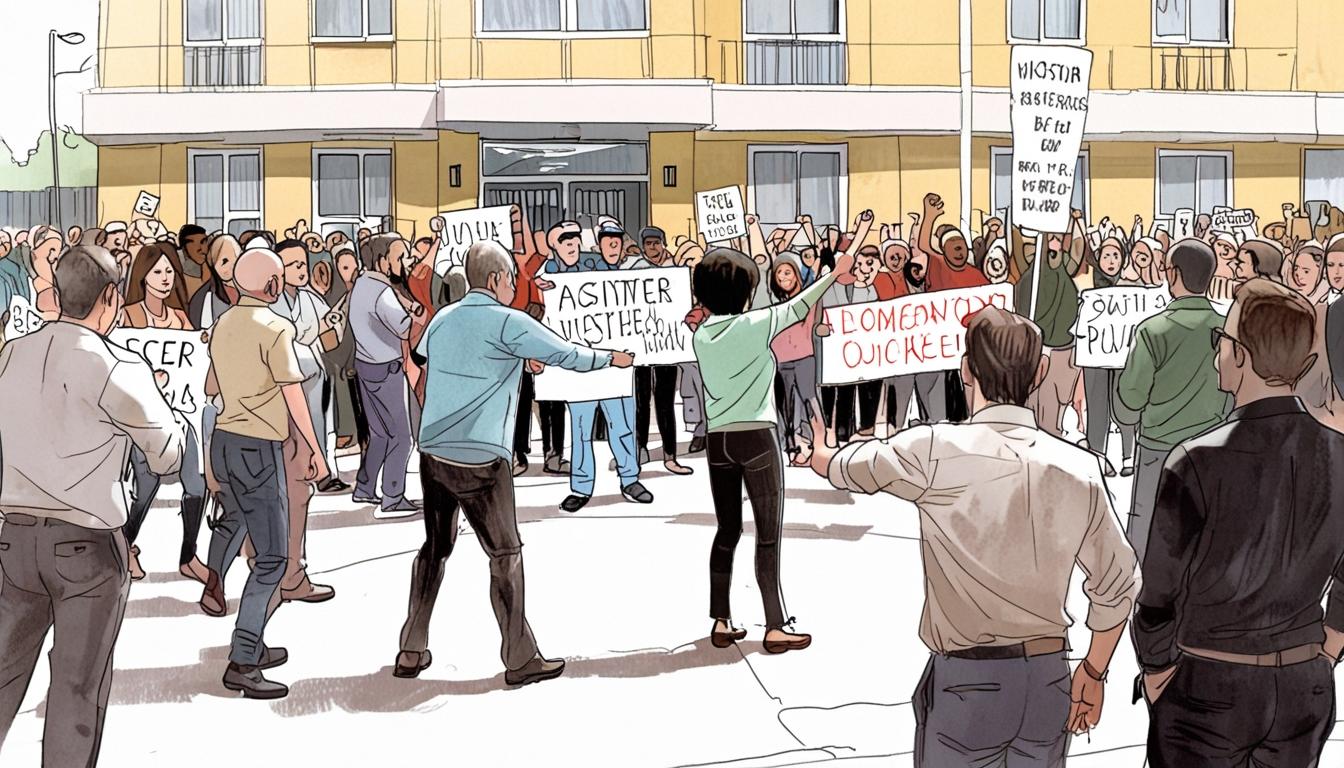Around 100 anti-immigration protesters gathered outside the Potters International Hotel in Aldershot, the site housing asylum seekers, igniting a tense standoff with pro-migrant demonstrators. This latest protest follows a history of violence surrounding the hotel, notably last July, when a peaceful demonstration devolved into chaos. A mob of approximately 200 targeted the hotel, driven by false narratives surrounding a tragic stabbing incident that occurred at a children’s dance class in Southport, where three young girls lost their lives to a brutal attack.
The attack has been attributed to Axel Rudakubana, a teenager whose actions were falsely connected by social media to the asylum-seeker community, sparking nationwide riots that spread across various towns and cities in England. Following the riots, which left over 69 police officers injured and resulted in widespread damage and disorder, His Majesty's Inspectorate of Constabulary and Fire & Rescue Services highlighted the critical need for police readiness to counteract the rapid spread of misinformation that incited violence. Chief Inspector Andy Cooke stressed that the police must learn from these events to prevent future outbreaks of unrest.
Despite the initial claims linking the attack to an Islamist migrant, investigations revealed that Rudakubana was a British citizen of Rwandan descent and influenced by extremist ideologies, including materials associated with al-Qaeda. This confusion around the attack’s motivations provided fertile ground for misinformation, resulting in aggressive protests and counter-protests that have become increasingly common in recent months.
At the recent demonstration in Aldershot, anti-immigration protestors displayed stark signage, calling for policies that prioritise British citizens over migrants, chanting slogans like "send them back." UKIP leader Nick Tenconi and representatives from right-wing groups were present, signalling a broader mobilization of far-right sentiments in response to the ongoing immigration crisis. The anti-immigration marchers pinned their grievances on a lack of local resources in Aldershot, voicing concerns about the economic strain allegedly caused by accommodating asylum seekers.
In contrast, pro-migrant demonstrators, representing groups such as Stand Up to Racism, pushed back against the anti-immigrant rhetoric, advocating for a celebration of diversity and the welcoming of refugees. This ideological divide reflects the broader societal schism regarding immigration policy, with many advocating for compassion while others see it as a threat to local communities.
The protest was further complicated by the presence of a Christian preacher, who attempted to preach neutrality but was ultimately confronted by counter-protesters. This intersection of community discord highlights the growing tensions in areas facing increased pressures from migration and public manageability.
The events in Aldershot are not isolated; they resonate with a recent parliamentary investigation that flagged shortcomings in police and legal responses to social media misinformation. Misinformation around the Southport attack led to a public outcry and drew calls for reform in contempt-of-court laws that typically restrict timely information sharing. Lawmakers are pushing for stronger internet regulations to curb the spread of harmful narratives that can engender violence.
The situation underscores the need for community dialogue, as many protesters like a local business owner expressed frustrations about resource allocation and the perceived burden of asylum seekers on local services. Such sentiments, fuelled by a lack of understanding and misinformation, necessitate immediate attention from both community leaders and policymakers to foster reconciliation and address the multifaceted issues underlying these protests.
As the debate around immigration continues, the government faces a challenge in balancing the need for compassion towards genuine refugees with the concerns of local populations. Ultimately, addressing these deep-rooted concerns and the misinformation that fuels them will be crucial in moving forward and preventing further unrest.
Reference Map:
- Paragraph 1: [1], [2], [5], [6], [7]
- Paragraph 2: [2], [3], [4]
- Paragraph 3: [1], [2], [4]
- Paragraph 4: [1], [3], [5]
- Paragraph 5: [4], [5]
- Paragraph 6: [1], [3], [7]
- Paragraph 7: [4], [5]
Source: Noah Wire Services
